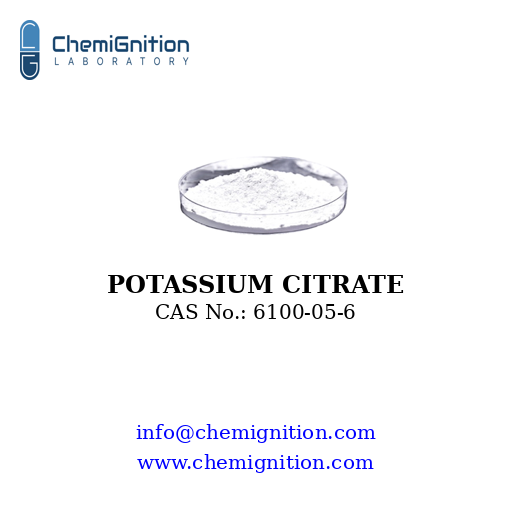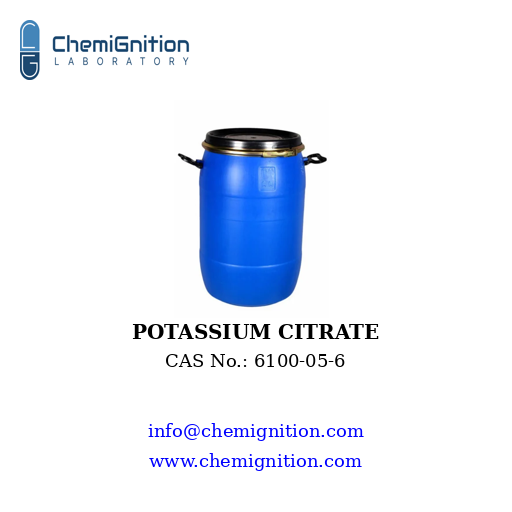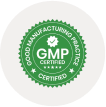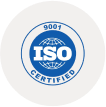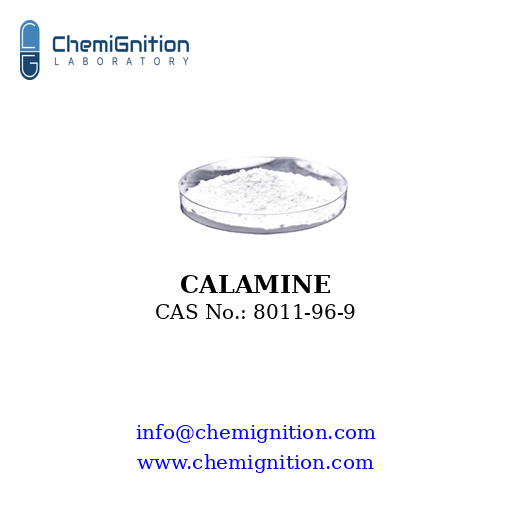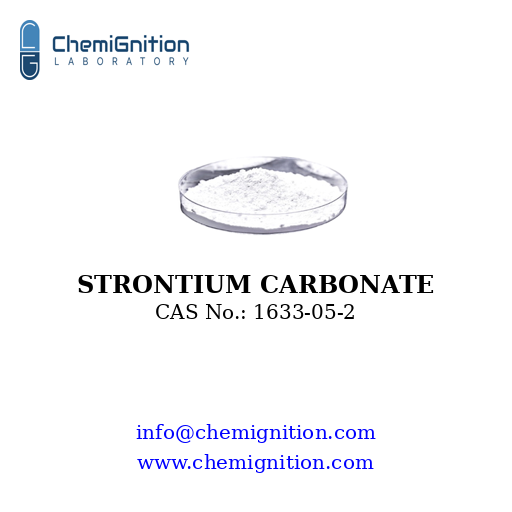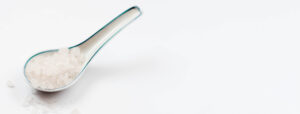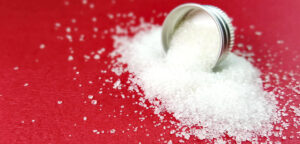Key Properties of Potassium citrate
| Product Name: | Potassium Citrate |
| Synonyms: | Tripotassium citrate |
| CAS No: | 6100-05-6 |
| Chemical Formula: | C₆H₅K₃O₇ |
| Grade: | IP / BP / USP / FCC |
| Appearance: | White crystalline powder or granules |
| Molar Mass: | 306.39 g/mol |
| Solubility: | Freely soluble in water, insoluble in alcohol |
| Melting Point: | Decomposes before melting |
Manufacturing process of Potassium citrate
1. Raw Material Selection:
- Procure high-purity Citric Acid and Potassium Hydroxide / Potassium Carbonate as primary raw materials.
- Ensure all raw materials meet pharmaceutical (IP/BP/USP) or food-grade (FCC) quality standards.
2. Solution Preparation:
- Dissolve Citric Acid in purified water to prepare a citric acid solution.
- Separately, dissolve Potassium Hydroxide or Potassium Carbonate in purified water.
3. Reaction and Mixing:
- Gradually add the potassium solution to the citric acid solution under controlled conditions.
- Maintain stirring and temperature control to ensure complete reaction.
- Continuously monitor pH and concentration to achieve the desired Potassium Citrate solution.
4. Filtration:
- The reaction mixture is filtered to remove any undissolved impurities or solid particles.
- Use multi-stage filtration for high-purity product.
5. Concentration (Evaporation Process):
- The filtered solution is concentrated using evaporators to remove excess water.
- Control temperature and vacuum settings to prevent product degradation.
6. Crystallization:
- The concentrated solution is cooled gradually to induce crystallization of Potassium Citrate.
- Control cooling rate and agitation for uniform crystal formation.
7. Centrifugation & Drying:
- Crystals are separated using centrifugation or filtration.
- The wet product is dried in fluid bed dryers (FBD) or vacuum dryers to achieve the desired moisture content.
8. Milling & Sieving:
- The dried Potassium Citrate is milled and passed through a vibro sifter to obtain the required particle size distribution (PSD).
9. Quality Control & Testing:
- The final product undergoes rigorous quality control (QC) tests, including:
- Purity & Assay (IP/BP/USP/FCC standards)
- Moisture content
- pH and solubility
- Heavy metals & microbial limits
10. Packaging & Storage:
- The finished Potassium Citrate is packed in double-layer polybags inside HDPE drums or fiber drums.
- Labeled as per regulatory requirements and stored in a cool, dry place to maintain stability.
Applications of Potassium citrate
Technical Specifications of Potassium citrate
| Sr. No. | Test | Specification |
|---|---|---|
| 1 | Description | White crystalline powder or granules |
| 2 | Assay (Purity) | 99.0% – 100.5% |
| 3 | Loss on Drying | 3.0% – 6.0% |
| 4 | pH (5% solution) | 7.5 – 9.0 |
| 5 | Solubility | Freely soluble in water, insoluble in alcohol |
| 6 | Chloride (Cl⁻) | Not more than 50 ppm |
| 7 | Sulphate (SO₄²⁻) | Not more than 150 ppm |
| 8 | Heavy Metals | Not more than 10 ppm |
| 9 | Iron (Fe) | Not more than 5 ppm |
| 10 | Lead (Pb) | Not more than 2 ppm |
| 11 | Arsenic (As) | Not more than 1 ppm |
| 12 | Residue on Ignition | Not more than 0.1% |
Packing and Storage condition of Potassium citrate
Packing:
- Potassium Citrate is packed in HDPE drums, fiber drums, or kraft paper bags with inner double-layer polyethylene liners to ensure product stability.
- Standard packaging sizes include 25 kg or 50 kg bags/drums.
- Custom packaging options are available based on specific requirements.
Storage Conditions:
- Store in a cool, dry, and well-ventilated area away from moisture, heat, and direct sunlight.
- Keep the container tightly closed to prevent contamination and maintain product integrity.
- Recommended storage temperature: Below 30°C.
Why Choose Chemignition for
Potassium citrate Supply?
Quality Assurance
Grade Compliance
Potassium citrate is manufactured in adherence to stringent global pharmaceutical standards.
In-House Quality Control
Each batch undergoes rigorous testing for purity, stability, and efficacy.
Regulatory Approvals
Certified for export and compliant with international regulatory requirements.
Large-Scale Manufacturing and Export
Grade Compliance
Potassium citrate is manufactured in adherence to stringent global pharmaceutical standards.
In-House Quality Control
Each batch undergoes rigorous testing for purity, stability, and efficacy.
Regulatory Approvals
Certified for export and compliant with international regulatory requirements.

